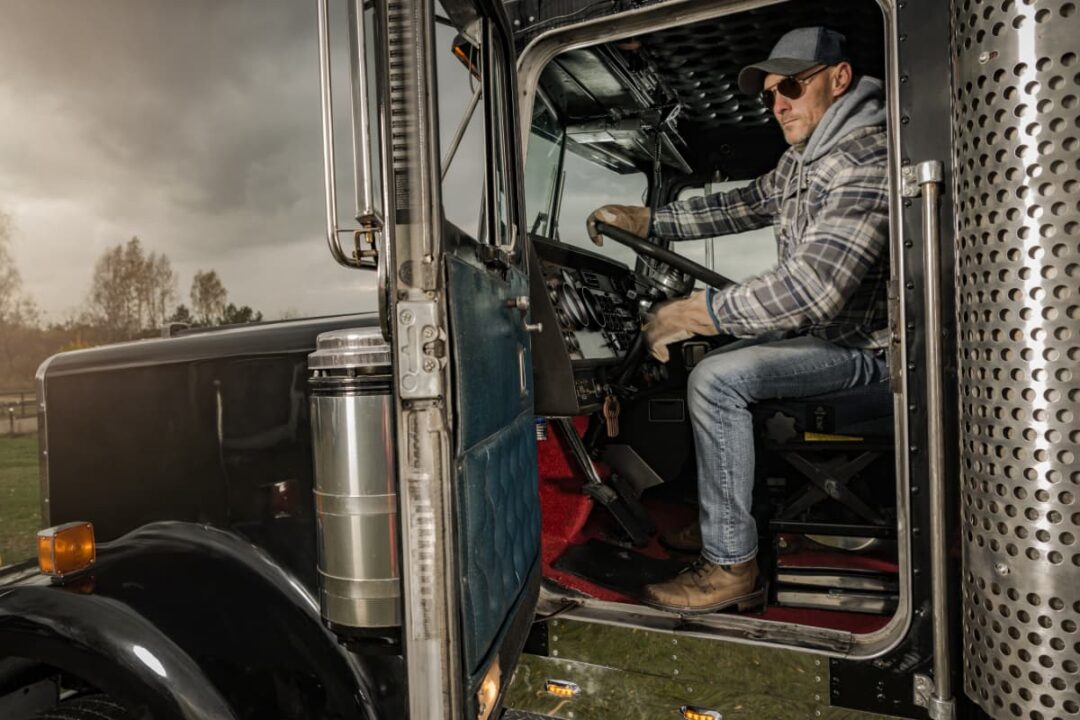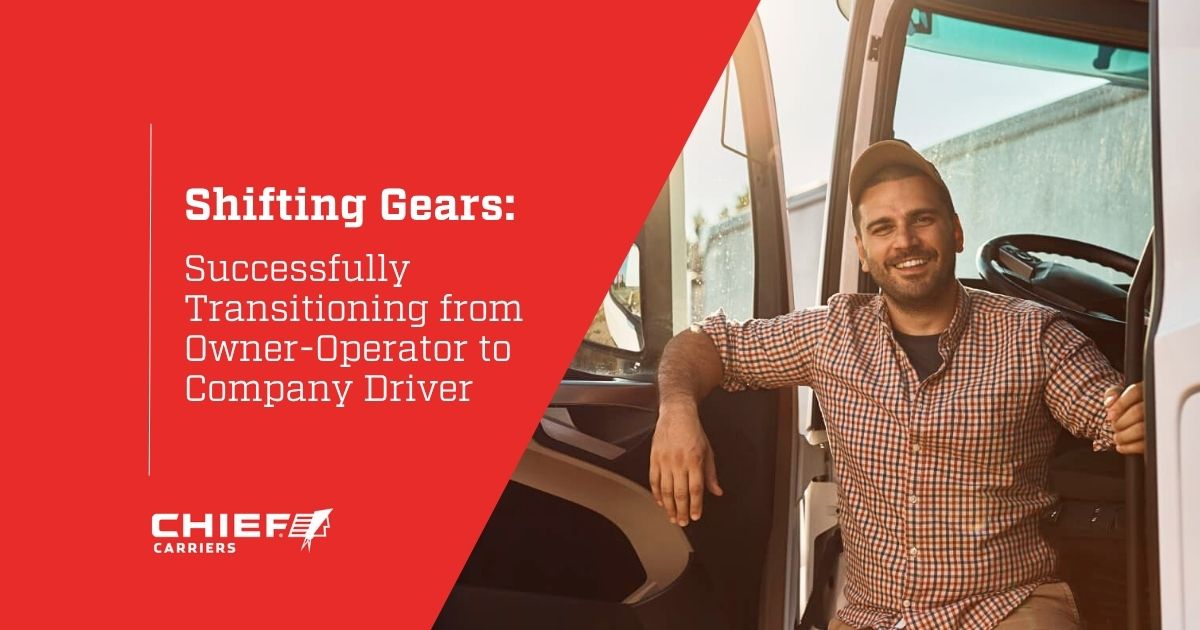Going From Owner-Operator to Company Driver: Reset for Success
Are you a truck owner-operator feeling the pressure of rising costs, endless paperwork, and the general weight of running a business? If you’ve started to wonder if the grass is greener on the other side, you’re not alone. The career path of a truck driver can take many forms, and a shift from being an owner-operator to company driver can be a beneficial move, provided you know a few things beforehand.
Chief Carriers is a leading flatbed carrier dedicated to supporting drivers at every stage of their career, especially during significant transitions. We understand the challenges you face when deciding to become a company truck driver after being an independent contractor. We’ll walk you through the essential steps to successfully navigate this new chapter that offers a new sense of stability, a different kind of freedom, and a renewed passion for the open road.

First Things First: Perform an Honest Self-Assessment
The owner-operator failure rate is well-documented within the industry—many drivers choose to become owner-operators for the freedom of being their own boss, but the reality of running a small business can be more challenging than expected. Common reasons for independent contractor failure can include unexpected repair costs, poor financial planning, market fluctuations, and a lack of understanding of the business side of trucking.
If you’re considering transitioning from owner-operator to company driver, two questions you need to be able to answer honestly are “Why did my owner-operator business fail, and what part did I play in that happening?” Being able to admit mistakes you made and recognize the lessons learned from those mistakes will go a long way in making your trucking career transition a successful one.
If you didn’t succeed as an owner operator, it’s worth asking if your methods were really as solid as you thought? It’s easy to point at the carrier, the market, or bad luck, but rarely is failure only about outside forces. Just like we’re quick to take credit when things go well, we need to own our role when they don’t. That’s not defeat—it’s the starting point for growth. Every setback carries a lesson if you’re willing to take responsibility and learn from it.
-Andrew Winkler, General Manager of Chief Carriers

Transitioning from Owner-Operator to Company Driver: Why Make the Change?
Making the decision to leave independent contracting behind and return to a company position can feel like a step backward. But this is where mindset is so important.
Instead of fixating on what you feel you’ve lost or dwelling on the idea that you’re “giving up,” change the internal narrative you’re telling yourself. Focus on the positive aspects of being a company truck driver to reframe your career move as a strategic choice for greater stability and a better quality of life.
Here’s a comparison of being an owner-operator vs. a company truck driver:
Financial Stability
- Owner Operator: Your income can be highly variable. A great month might be followed by one where you lose money due to truck owner-operator costs like fuel, maintenance, insurance, and tires.
- Company Driver: You trade variability and truck costs for a steady paycheck and guaranteed income.

Less Responsibility
- Owner Operator: Running your own business means being a driver, mechanic, accountant, and logistics manager all at once.
- Company Driver: The company handles business management, paperwork, taxes, and finding loads. Your primary focus becomes what you do best: driving.
Benefits and Perks
- Owner Operator: You must provide your own benefits for medical insurance, retirement, and savings for taking days off.
- Company Driver: Many carriers offer a comprehensive benefits package with company-provided health insurance, dental and vision coverage, retirement plans like a 401(k), paid time off, and other valuable employee benefits.
Reduced Stress
- Owner Operator: The constant pressure of running a business—worrying about profitability, unexpected breakdowns, and finding the next load—can take a serious mental toll on you.
- Company Driver: The transition to a company driver role can lead to a significant reduction in stress, allowing you to focus on a healthier work-life balance and enjoy your time on the road.
When you’re a company driver, things are pretty much taken care of for you. You just have to show up, get in the seat, operate the truck safely, deliver on time, pick up on time, and go home and collect your paycheck. You know that everything else about the truck, the money, the safety—all that stuff is handled for you.
-Andrew Winkler

Step-by-Step Guide for a Successful Transition
Making the shift from owner-operator to company driver requires careful planning because, without a good exit strategy, it can lead to more headaches down the road. Following these steps can help ensure a smooth and successful career transition away from being an independent contractor.
Step 1: Financial and Business Preparation
Before you can begin your job search, you need to tie up the loose ends of your business—a critical and often overlooked part of the process.
- Sell Your Truck: You have a few options for selling your rig, including selling it privately, through a dealership, or to another owner-operator. For lease operators, you can also talk to your leasing company about ending your agreement early. Researching market values and preparing your truck for sale will help you get the best price.
- Address Business Debts and Obligations: You need to manage outstanding loans, leases, and other business-related expenses. Creating a clear financial plan to pay off or restructure debts is essential for a clean slate.
- Organize Your Finances and Taxes: Your income stream and deductions will change dramatically, so be sure to gather all your business-related tax documents, receipts, and records. Consult with a tax professional to understand the implications of ending your business and how your new employment will affect your future tax returns.

Step 2: Finding the Right Fit
As a former owner-operator, you’ve managed your own business, handled maintenance, and navigated the complexities of logistics. This invaluable experience gives you a huge advantage in the job market.
- What to Look for in a New Company: Don’t just take the first job you’re offered—consider key factors like pay structure, benefits, company culture, equipment quality, and the routes they offer. Look for a company that values your experience and offers a supportive environment.
- Evaluating Companies: Research and compare different trucking companies by looking at reviews, speaking to current drivers, and asking detailed questions during your interviews. Be cautious of trucking companies with lease purchase programs if you’ve had a bad experience, and be sure to fully understand the terms before you commit.
- Leveraging Your Truck Driver Experience: You’re not just a driver; you’re a business-savvy professional—highlight your unique skills during your application and interview. Emphasize your problem-solving abilities, your attention to detail in maintenance and safety, and your strong work ethic.
RELATED: A Guide to the Truck Driver Job Search
Step 3: The Job Application and Onboarding Process
Once you’ve found the right company, the application process will be familiar, but with some new elements.
- The Application: Be prepared to fill out a standard application and provide your driving history, including your time as an owner-operator.
- Orientation and Training: Most companies require a brief orientation period where you’ll learn company policies, meet key personnel, and get acclimated to your new role. While you may not need the same training as a new driver, this is a crucial step to ensure a smooth truck driver career transition.
Instead of coming into orientation trying to impress with big stories or proving you know it all, take a moment to listen. The people here have years of experience worth learning from—respect that, and you’ll get further, faster.
-Andrew Winkler

Navigating the New Role as a Company Truck Driver
Once you’re on the job, there will be a period of adjustment. The routine and responsibilities will be different, but in a good way.
- Adjusting to the New Structure: Your daily life and work routine will change as you’re communicating with dispatchers, adhering to specific schedules, and following company procedures.
- Understanding Company Policies: Take the time to understand your new company’s rules and expectations, from dispatch communication to maintenance procedures.
- Career Growth Opportunities: Leverage your deep knowledge of the industry by exploring potential career paths beyond just driving, such as becoming a driver trainer, dispatcher, or safety manager.
RELATED: How Transparent Company Culture Fuels Truck Driver Retention

Potential Challenges and How to Overcome Them
While the transition offers many benefits, it’s not without its challenges. Being aware of these can help you overcome them.
The Mental Shift
Going from being your own boss to working for a company requires a significant mental shift. You are no longer in complete control as you were as an independent contractor.
Loss of Control
This can be a tough adjustment. You’ll have less say over routes, schedules, and truck maintenance. Remember, the company’s success is tied to yours, so they have a vested interest in providing you with sound equipment and efficient routes.
Financial Adjustment
Managing the change from fluctuating settlements to a fixed paycheck can be a challenge. Create a new budget and financial plan based on your stable income.
Let’s think of this as a time to reset. So you did the lease program somewhere else, and it didn’t work. Now let’s walk in, be humble, and be curious.
-Andrew Winkler

A New Chapter Awaits
Admitting that your independent contractor business wasn’t working and being humble about starting over is a sign of self-awareness and strength. The transition from an owner-operator to a company driver isn’t a step backward—it’s an opportunity to get back on track and refocus on what matters. When done right, it’s a strategic and positive move that can lead to greater stability, a better quality of life, and a renewed love for driving.
If you’re a driver who has found that being a lease operator or owner-operator didn’t fit your long-term goals, we at Chief Carriers invite you to explore a new path. We understand the challenges you’ve faced and are committed to helping you build a successful and stable truck driver career. Contact us and take the necessary steps today to start your next chapter.
To hear more about the journey from being an owner-operator to finding a stable career as a company driver, we invite you to listen to our General Manager, Andrew Winkler, in the Driven Too Far podcast episode, “Moving From Owner Operator Back to Company Driver.”

